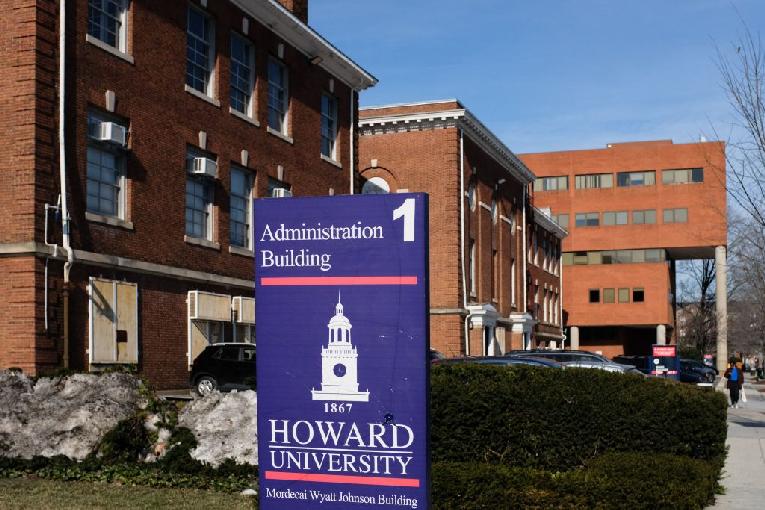*(CNN) — As Howard University students returned to campus on Monday for the start of the fall semester, the university received two bomb threats just months after the school and other historically Black colleges and universities had to lock down or postpone classes because of similar threats.
Early Friday morning, two on-campus residence halls that can house over 1,800 students, East and West Towers, were evacuated following an anonymous bomb threat at the Washington, DC, school. Students could be seen gathered in various locations near and around campus in their pajamas as they waited for an all-clear to return to their dorms.
On Tuesday night, another residence hall, Cook Hall, was cleared due to a bomb threat received by phone. In both instances, students residing in the dorms were assigned to safe areas until an all-clear was announced a few hours after the initial threats.
On Friday, police and university officials conducted a sweep of the dorms with K-9 units, according to CNN affiliate WUSA9. Preliminary information suggests that investigators have leads on the location of the originating call. Howard University said they’ve been in contact with federal officials assigned to the investigation of similar threats made against HBCUs.
OTHER NEWS ON EURWEB: Howard University Reaches Agreement with Student Protesters Over Mold, Rodent Problem
According to a letter sent by Howard University president Wayne A.I. Frederick to students and staff on Friday, the most recent threat marks the eighth bomb threat of the year at the school, which he referred to as “another terroristic act.”
“I want to be clear about the university’s position on the narrative of these threats,” Frederick wrote. “This isn’t about resilience and grit. We require extra resources from all law enforcement agencies directed towards solving this ongoing threat and bringing those who perpetrate its negative effects to full justice under the law.”
At least 57 HBCUs across the country received bomb threats via phone calls, e-mails, instant messages and anonymous online posts since January, according to the Federal Bureau of Investigation. More than a dozen had to lock down or postpone classes on the first day of Black History Month after at least 18 HBCUs received bomb threats.
Following the series of threats, the Biden administration launched an FBI investigation in early February. The FBI said the threats would be investigated “as racially or ethnically motivated violent extremism and hate crimes.”

Since the start of the investigation six months ago, no arrests have been made, and HBCU students and school leaders say they’re frustrated at the lack of progress.
“We remain concerned about any threats to our college and community and want to ensure that the safety of our institutions and students are prioritized as equal to any other security threat,” said Helene Gayle, president of Spelman College in Georgia. “We look forward to learning more about how law enforcement officials are addressing these issues.”
CNN has reached out to other HBCUs that received bomb threats this year, including Howard University, Fort Valley State University and more, for comment.
The FBI in a statement told CNN last week that the investigation of the bomb threats remains ongoing and they’re working with over 30 FBI field offices “across the country to pursue leads and identify the individuals responsible for making these criminally and racially motivated threats of violence.”
“The FBI takes all threats seriously and we regularly work with our law enforcement partners to determine their credibility and keep our communities safe,” the FBI statement said. “As students across the country begin returning to school, the FBI offers a reminder that issuing a threat is a crime and those who post or send threats can face federal, state, or local charges.”
Students say they’re ‘not surprised’
Jy’Mir Starks was in his dorm room with his roommate at Howard University when he heard the news of a bomb threat made in February. Six months later, he was shocked to wake up to the news that another bomb threat had been made targeting a residence hall on Tuesday.
“I can only imagine that must have been frightening because it targeted Cook Hall, which is a freshman male dorm, and the students were evacuated, which was probably jarring because this is our first week of class,” Starks, a junior, said.
Rebecca Beavers, a senior at Morgan State University in Maryland, said the fact that no one has been arrested in connection to the bomb threats is scary because someone could threaten the schools again.
“I didn’t know who made the threats, but something was telling me that if they were just targeting HBCUs, then it definitely felt targeted towards Black students, almost like they wanted to scare us from pursuing our education,” Beavers said.
Going into the first week of classes earlier this week, she said she wasn’t too concerned about the threats from February, but they were definitely looming in the back of her mind.
Netanya Onyilo, a sophomore at Spelman College in Georgia, said she feels as if the threats have been forgotten on a national level, adding that she believes there’s a lack of concern because HBCUs were targeted.
“Because we’re HBCUs and we’re not [predominantly White institutions], we’re deemed as less important. The fact that they don’t react in such a quick manner is very telling,” Onyilo said.
In March, the US Department of Education announced that several HBCUs that received bomb threats would be eligible for federal grants aimed at improving mental health resources and campus security.
HBCUs are eligible to apply for funding under the Project School Emergency Response to Violence (Project SERV) program, which provides grants ranging from $50,000 to $150,000 per school, according to the Education Department.
“The recent bomb threats experienced by HBCUs have shaken students and fractured their sense of safety and belonging, which are critical to their academic success and wellbeing,” Education Secretary Miguel Cardona said in a March statement.
CNN has reached out to the Education Department for comment.
Last week, Southern University Law Center in Louisiana announced they were the first HBCU to receive a grant from Project SERV. A spokesperson for the university told CNN the grant was $133,200 and would go toward conducting a series of questionnaires to assess the mental health consequences related to the bomb threat.
From the bomb threats that occurred in February across HBCUs to those that happened at Howard University this week, Starks said students are becoming desensitized to threats of violence. The day after the Tuesday threat, the campus environment didn’t feel different, and everyone went to classes and various on-campus events as if nothing happened the previous night, he said.
“If it’s going to become normalized to where we’re going to get bomb threats, it makes you question like one day is it not going to be a threat?” Starks said. “There’s being desensitized, and then there’s the reality. I don’t think anyone of us understands the actual reality, myself included.”
The-CNN-Wire
™ & © 2022 Cable News Network, Inc., a Warner Bros. Discovery Company. All rights reserved.
We Publish News 24/7. Don’t Miss A Story. Click HERE to SUBSCRIBE to Our Newsletter Now!





